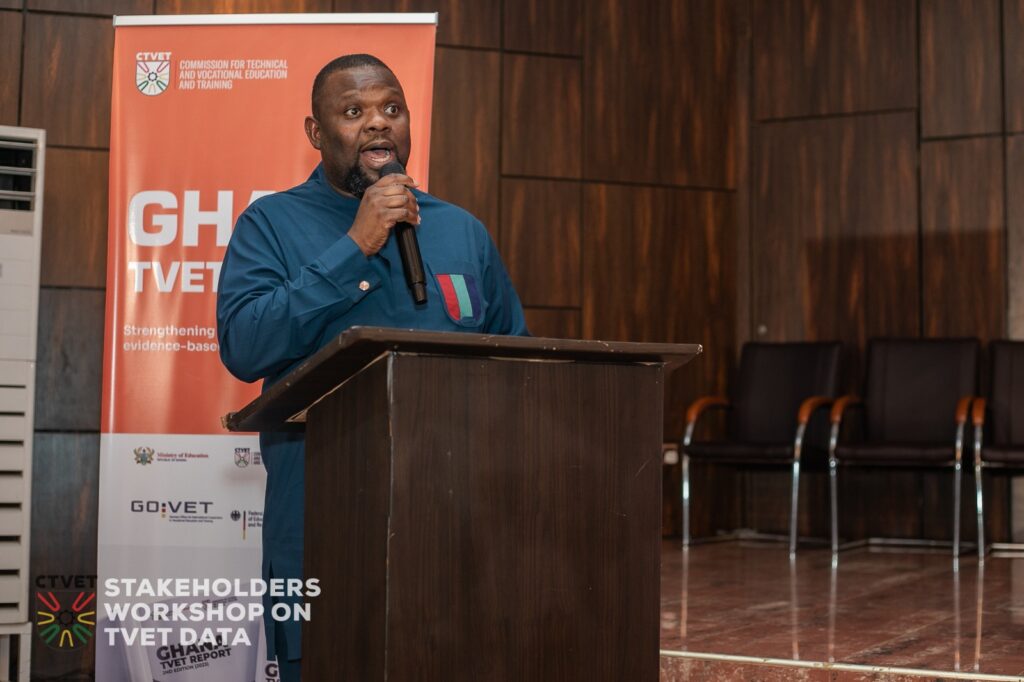Ghana’s determination to reimagine its Technical and Vocational Education and Training (TVET) system entered a decisive phase this week as policymakers, educators, and development partners converged in Accra for a two-day workshop on evidence-based data monitoring and reporting.
The gathering, organised by the Commission for Technical and Vocational Education and Training (CTVET), made one thing clear: without reliable data, Ghana’s ambition to make TVET a driver of industrial growth and job creation risks faltering.
The opening day rang with cautionary but hopeful tones.
“Without accurate data, we risk misallocating resources and missing opportunities to harness the full potential of TVET,” warned Kevin Antierku, Deputy Director for the TVET Directorate at the Ministry of Education, speaking on behalf of the Director.
His concerns were echoed by Anthony Seyram Kwame Zu, Deputy Director-General of CTVET, who stressed that “reliable data is the bedrock of planning, monitoring, and accountability.” He argued that Ghana’s training programmes must be constantly measured against labour market needs if they are to remain relevant.
International partners added their voice. Christin Lucille McConnell, UNICEF’s Chief of Education in Ghana, described data as “a foundation for equity, accountability, and efficiency.” Julia Olesen, Senior Technical Advisor at Germany’s Federal Institute for Vocational Education and Training (BIBB), pointed to Germany’s global reputation for data-driven vocational training as a model Ghana could adapt.
Panel discussions and academic presentations deepened the conversation. Research from Takoradi Technical University, AAMUSTED, and Accra Technical University showcased existing gaps and opportunities, while the Ghana Education Service introduced its Mobile School Report Card initiative. CTVET and the TVET Service outlined new directions for evidence-based reporting, signalling a shift from theory to action.
The second day of the workshop pivoted from dialogue to strategy.
Ms Olesen of BIBB returned with an in-depth presentation on Germany’s integrated TVET data systems. Inspired by this, participants formed breakout groups to tackle practical challenges:
- Building modern TVET management information systems.
- Improving data acquisition and quality assurance.
- Developing clear, relevant indicators for policymaking.
- Strengthening communication and coordination across institutions.
Concrete proposals emerged, including stronger graduate tracer studies, more robust datasets on informal apprenticeships, and integrated digital reporting systems to improve accountability across the sector.
Closing the workshop, Mr. Zu described data as “the lifeblood of modern policymaking”, warning that Ghana’s TVET sector remains “too fragmented and underutilised” to guide the nation’s economic aspirations.
The workshop drew participants from across Ghana’s development spectrum: the Ghana Statistical Service, the National Development Planning Commission, universities, trade associations, and partners such as UNESCO, UNICEF, ILO, and GIZ.
Together, they sent a clear signal that Ghana’s skills development agenda is a national project—one that must be rooted in transparent, timely, and credible data.
By the end of the two days, consensus was firm: Ghana has made strides, but without embedding evidence-based systems at the heart of TVET, the country risks falling short of preparing its young people for the realities of a rapidly shifting job market.
As one participant put it, “A data-driven TVET system is not a luxury; it is the foundation for Ghana’s economic transformation.”
Click the link Puretvonline.com | WhatsApp Channel to join the WhatsApp channel
GOT A STORY?
Contact/WhatsApp: +233243201960 or manuelnkansah33@gmail.com

